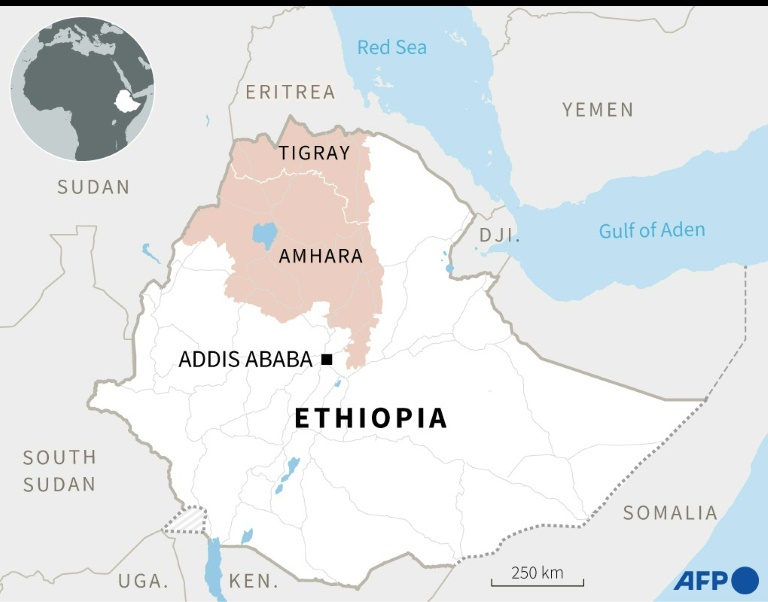AFP
Ethiopia’s federal government on Friday declared a six-month “state of emergency” as violent clashes escalate between the national army and local fighters from the northern region of Amhara.
The fresh unrest in Africa’s second-most populous country comes just nine months after the end of a devastating two-year war in the neighbouring region of Tigray which also drew in fighters from Amhara.
“It has become necessary to declare a state of emergency as a situation has emerged where it has become difficult to control this unacceptable movement under current law,” the office of Prime Minister Abiy Ahmed said in a statement posted on social media.
The government communications service later said the measures would cover Amhara “for six months” but could be imposed “nationwide in relation to any situation or movement that aggravates the security problem”.
Clashes in Amhara have escalated in recent weeks, prompting travel warnings from foreign governments and the grounding of flights.
Tensions have been rising since April when the federal government announced it was dismantling regional forces including in Amhara, where nationalists feared the move would weaken the region.
On Thursday, local authorities in Amhara asked the federal government for assistance managing security as the situation had become “difficult to control” and was causing social and economic disruption.
The government said the violence “endangered the constitutional order” and the decision to invoke a state of emergency was “unanimous”.
According to the decree, street rallies and gatherings are banned, while anyone found violating its provisions could face “imprisonment of between three to ten years”.
The decree also allows the authorities to declare curfews and for suspects to be searched and held without a warrant.
A resident of Lalibela, a UNESCO World Heritage site famous for its 12th and 13th century rock-cut churches, told AFP on condition of anonymity that the town and its airport were both under the control of the local militia Fano.
“There is movement of civilians and people as we speak and there hasn’t been any exchange of fire” between federal forces and Fano fighters, he said, adding that internet had been restored after an hours-long outage.
A rickshaw driver in Gondar, another city in Amhara, said the internet was down and the mood was “tense” following fighting on Thursday.
“Fano (fighters) are roaming around the city here and possibly preparing for a big fire exchange” in case federal troops, which had retreated, return to Gondar.
The Ethiopian Human Rights Commission on Friday said that civilians had been attacked, with damage reported to property, while transport services and internet had been suspended in some areas.
“Restrictions on movements have been imposed in some places,” the state-affiliated independent rights watchdog said, urging the authorities to take “all necessary precautions… to avoid any harm and human rights violations” during their operations.
Ethiopian Airlines, the national carrier, on Friday announced it had cancelled flights to the regional cities of Dessie, Lalibela and Gondar.
Amhara’s regional forces and local militias backed Ethiopia’s army in their war against rebels from Tigray.
That conflict ended with a peace deal in November 2022 but Amhara “special forces” and Fano fighters continue to control Western Tigray, a fertile expanse claimed by both Tigray and Amhara.
The peace accord angered nationalist elements in Amhara and protests erupted when Abiy announced that local forces would integrate into the army or regional police in a bid to bolster “unity” in multi-ethnic Ethiopia.
US Secretary of State Antony Blinken “expressed concern” about the situation in Amhara in a phone call with Abiy on Friday, US State Department spokesman Matthew Miller said.
The UK’s Foreign Office has warned its citizens against travelling to certain parts of Amhara, citing “increased violence in these areas characterised by Fano taking control of these areas”.
The Spanish Embassy in Addis Ababa on Tuesday also urged its nationals not to travel to Amhara, citing “instability” in the region.






